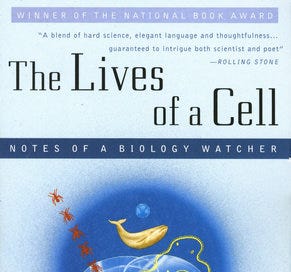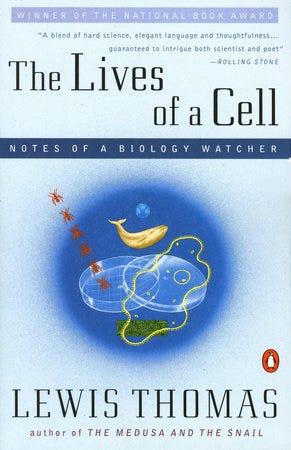The Next Leap: On Lewis Thomas, human superpowers, and communication
It's been a long time since I read Lewis Thomas's remarkable little book, The Lives of a Cell: Notes of a Biology Watcher, but its ideas have stayed with me through the years. What stands out most is Thomas's vision of life as a grand, interconnected tapestry—from the mitochondria inside our cells, to ant colonies, to the vast networks of human society.
Each chapter (or essay) is a meditation on how life at every scale builds on cooperation and communication. Thomas shows us how simple rules and interactions among organisms—or even among cells—can give rise to astonishing complexity and new abilities. Whether it's cells generating energy, slime molds solving mazes, or social insects creating sophisticated communities, biology is full of examples where the whole is greater than the sum of its parts.
For me, the book's most inspiring idea is that humanity's true superpower is our capacity for communication. Through language, culture, and shared knowledge, we build collective intelligence that transcends any single lifetime. This is what allows us to adapt, innovate, and thrive as a species—much like the cooperative systems Thomas describes throughout the natural world.
The Pace of Change
I remember when my family got our first TV—I was maybe in third grade. In middle school, we had a party line phone. (Poor parties: teen girls + phone = hours. 😂) It was the late 1970s when I worked with my first computer, a hardwired network used by Avis. This was years before PCs. I recall my uncle bought a 4-gigabyte hard drive for one of the first PCs; he paid $2,000 for it, probably equivalent to $8,000 or $10,000 today. But of course, today you can get terabytes of data in your pocket for far less than a concert ticket.
We all know how the World Wide Web exploded—about 67% of the world's population is online now, up from basically zero in 1990. That's way less than the span of one lifetime: from party lines to global connectivity in your pocket.
And now there's AI - really large language models. This extends our superpower of communication, creating new forms of thinking together. Human creativity and judgment combine with AI's ability to recognize patterns and organize information rapidly. This produces brand new possibilities for the human species.
I experienced this while working on a website design. I had a vision and judgment while the AI handled technical synthesis and rapid iteration. Keywords: 'rapid' and 'synthesis'. It can organize and cross-reference topics rapidly, but it can't see the big picture the way humans do. We built on each other's contributions until we created something neither of us could have made independently. By the time I could have created that alone, I would have forgotten half my goals in the details, and I wouldn't have had the time to do it.
The Challenge
The collaboration between human intelligence and AI processing expands our capabilities as a species. We're developing new ways of communicating and creating together. This whole thing is definitely in early stages and there are growing pains. The challenge goes beyond adapting to new technology—it's that we're trying to navigate this transformation while dealing with accelerating inequality and environmental pressures.
And just to get my 2¢ in here: AI development comes with real costs for real communities. In tiny Tolar, Texas (population 940), developers want to build a massive 5,000-megawatt data center cluster. In Memphis, Musk's xAI installed 35 gas turbines without any permits, making it one of the city's largest sources of smog-forming pollution in a predominantly Black neighborhood that already has the state's highest asthma rates. The company says they don't need permits because the generators are "mobile"—even though they've been running for nearly a year.
Meanwhile, since 1975 the bottom 50% of Americans have seen their share of total wealth drop from 2% to 1.2%, while the top 1% went from 23% to 35% of all wealth. Plus, if wages had grown at the same rate as productivity since 1980, the median worker would make about $42,000 more per year today. So we have no extra resources to deal with the changes. Many people are barely surviving with what they have, and the middle class is disappearing. It's the middle class that handles problems like this.
The accelerating pace of technological change hits individuals and society hard enough when people have resources to adapt. When those resources have been systematically stripped away, it becomes overwhelming.
So Now What?
I see the potential for AI to equal the change brought about by writing, printing, the internet—and here we are. 🤷
Sometimes the challenges seem too big, the problems too insoluble. I know humanity has faced this level of crisis before and survived. I hope this time we do better than just survive. We could choose to thrive as a species.
I do think we need to learn how to manage the pace of change as we go through this dramatic upheaval. The pace will only accelerate. So we need to develop new skills as individuals and societies to deal with it better. What might those skills look like? Perhaps learning to adapt more fluidly, to collaborate across different perspectives, to distinguish between changes that matter and those that are just noise. Maybe we need better ways to pause and reflect even as everything speeds up around us.
Life is fascinating at the moment—this is a time of both crisis and remarkable opportunity. I'm mostly curious about where we're heading. While it's unlikely I'll see a final resolution in my lifetime, I'll get to witness part of the journey. Will we build systems that help us navigate change together, or will we be overwhelmed by it? I choose to trust us.
Read More:
AI's Power Hunger Is Hurting Communities—When Can We Fix It? - Explores the energy costs of AI development with specific examples and research-backed solutions for balancing technological progress with community needs.
Public Service Isn't a Business - Examines how applying business values to government undermines public services and contributes to inequality, using examples like Flint's water crisis.
AI and the Deflationary Future: How Tech Might Reshape the Economy Over the Next Decade by William Fleming Daniels - Analyzes how AI-driven productivity gains could create sustained downward pressure on prices while potentially raising living standards, drawing parallels to historical periods of "good deflation."
Leaning into our Humanity in the Age of AI (Part 1) by Liya Palagashvili - Discusses how AI can augment rather than replace human judgment, potentially democratizing expertise and revitalizing middle-skill work.
What if AI could rebuild the middle class? by NPR Planet Money - MIT economist David Autor explains how AI might reverse decades of job polarization and strengthen the middle class rather than worsen inequality.
Rising inequality: A major issue of our time by Brookings Institution - Comprehensive analysis of how technological change and globalization have driven rising inequality, examining the forces reshaping distributional dynamics in the digital age.
The Lives of a Cell: Notes of a Biology Watcher by Lewis Thomas - Lewis Thomas's influential exploration of cooperation and communication across all scales of life, from cellular to societal.




